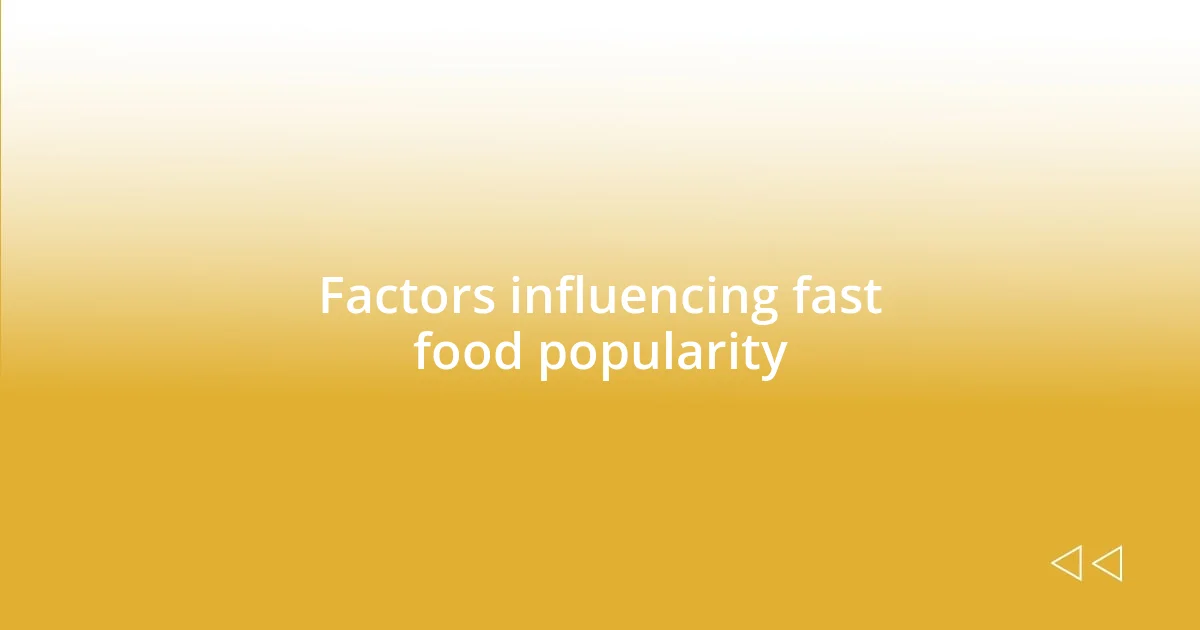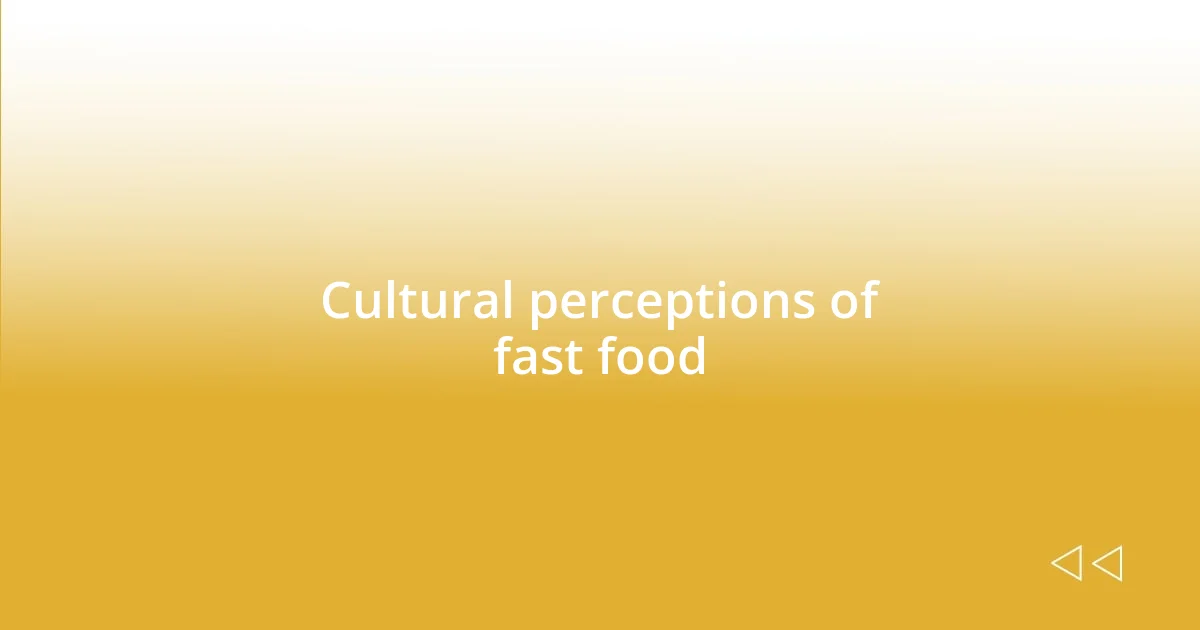Key takeaways:
- Fast food culture reflects modern societal values, emphasizing convenience and instant gratification over quality dining experiences.
- Health implications of fast food consumption include obesity, fatigue, and potential negative effects on mental health, highlighting the need for mindful eating habits.
- There is a growing movement towards healthier fast food choices, encouraging consumers to seek balance between convenience and nutritional value in their diets.

Understanding fast food culture
Fast food culture is a fascinating lens through which we can examine modern societal values. I remember my first trip to a drive-thru with friends as a teenager. The thrill of ordering quickly and chatting as we awaited our food created a sense of camaraderie, but it also made me realize how entrained we are to seek instant gratification in our meals. Isn’t it interesting how the convenience of fast food often overshadows the quality of what we consume?
The allure of fast food isn’t just about grabbing a quick meal; it’s embedded in our lifestyle and work culture. I found it poignant when I saw colleagues glued to their screens during lunch breaks, munching on burgers and fries, treating their meals more like a task to check off their lists than as a time to enjoy. How many of us have sacrificed our dining experience for the sake of efficiency? This begs the question: when did we start prioritizing speed over savoring our connections?
When we look deeper, fast food culture reflects not only our culinary choices but also broader themes like consumerism and globalization. I often contemplate how the widespread recognition of chains like McDonald’s signifies a shared, albeit superficial, sense of community and familiarity around the globe. Yet, is this sense of belonging genuine, or merely a byproduct of corporate branding? It’s a complex relationship we have with these establishments, one that deserves thoughtful consideration.

Factors influencing fast food popularity
One significant factor influencing fast food popularity is the fast-paced lifestyle many of us lead today. I often find myself rushing between work obligations and social commitments, leaving little room to prepare meals. The convenience of places like drive-thrus means I can pick up dinner without skipping a beat, but it also makes me reflect on my dietary choices. Fast food is like a quick fix, easily fitting into our hectic schedules.
Here are some key factors driving the appeal of fast food:
– Convenience: Quick service and accessibility make it easy to grab a meal on the go.
– Affordability: Many fast food options are budget-friendly, appealing to a wide range of consumers.
– Marketing Strategies: Clever ads and promotions attract attention, especially among younger demographics.
– Social Experience: These establishments often serve as social hubs, where friends and families gather, creating a sense of community.
– Globalization: The presence of international chains offers a familiar taste regardless of location, promoting a sense of comfort while traveling.
In addition to lifestyle pressures, psychological factors play a significant role in the appeal of fast food. I recall a time when I was feeling particularly down; a trip to my favorite burger joint not only lifted my spirits but also brought back nostalgic memories of carefree childhood days. Fast food seems to offer not just a meal but an emotional boost, tapping into our memories and cravings simultaneously.

Health implications of fast food
When it comes to the health implications of fast food, the stakes are high. I can’t help but feel a pang of concern each time I indulge in a greasy burger. Studies indicate that frequent consumption is linked to obesity and its related diseases, such as diabetes and heart disease. Personally, I’ve noticed that after a fast-food splurge, I often feel sluggish and lethargic, a sharp contrast to the instant pleasure I sought.
The convenience offered by fast food can cloud our judgment about long-term health. I remember a particularly busy week when I relied on takeout for dinner, thinking it would save time. However, as I looked in the mirror days later, I noticed changes in my skin and energy levels. It was a wake-up call for me, realizing that the easy route isn’t always the healthiest one. It’s fascinating how our lifestyle choices can manifest in tangible health effects, often without us even realizing it until it’s too late.
Moreover, there’s a growing body of evidence highlighting fast food’s role in mental health issues. I once spoke with a friend who struggled with anxiety, and we discussed how her comfort food habits inadvertently added to her stress. Research suggests that diets high in processed foods can impact brain chemistry, exacerbating mental health challenges. It’s critical to understand that fast food is more than just a dietary choice—it has far-reaching effects on both our physical and mental well-being.
| Health Implications | Effects |
|---|---|
| Obesity | Linked to metabolic disorders and increased risk of chronic diseases. |
| Fatigue | Often results from poor nutrition and high-calorie meals. |
| Mental Health | Processed foods can negatively affect mood and exacerbate anxiety. |

Cultural perceptions of fast food
Cultural perceptions of fast food vary significantly around the globe, shaped by factors such as local cuisine and social norms. I remember traveling to Italy and experiencing the locals’ bemusement at the sight of tourists flocking to burger joints. The reverence for fresh ingredients and home-cooked meals there made me appreciate the cultural roots of food, contrasting sharply with the fast food culture I’d grown accustomed to back home.
In many places, fast food symbolizes modern convenience and globalization, making it a staple. I often think about how a quick lunch from a familiar chain can evoke feelings of nostalgia, especially when I recall college days filled with late-night fries and milkshakes. But then I wonder, does this convenience come at the cost of culinary diversity? It’s fascinating to see how beloved dishes can sometimes fade into obscurity when international brands dominate the landscape.
However, there’s an emerging sentiment of resistance against fast food culture in various societies, driven by a desire for healthier options and a return to traditional cooking. I recently engaged in a discussion with friends who are increasingly opting for local eateries over chains, emphasizing quality over speed. This shift sparks a deeper consideration about our food choices and their implications on community and health, prompting me to ask: Can we reshape our eating habits to reflect a balance between convenience and cultural richness?

Balancing fast food habits
Finding balance in fast food habits can be tricky, but it’s essential for maintaining overall well-being. I remember a recent Saturday when I decided to treat myself to my favorite fried chicken after a long week. It felt like a celebration, but the next day, I was regretting that decision as I felt sluggish. This experience got me thinking: how often do we let convenience overshadow our health? It’s crucial to recognize that these indulgences should remain just that—indulgences, not daily staples.
I also believe that being mindful of what we consume is vital. When I consciously decide to swap a greasy burger for a grilled option, I often find myself feeling more energetic and focused throughout the day. It’s amazing how a small change can make such a significant impact. I often ask myself, “What am I really craving?” Most of the time, the answer isn’t just comfort food; it’s nourishment that fuels my body and mind.
In holding myself accountable, I’ve started involving friends in my journey towards balanced eating. A few of us have made it a habit to explore healthier fast-food alternatives together. This camaraderie not only makes the process more enjoyable but also adds a layer of community to our dining experience. It begs the question: how can we creatively navigate our fast food habits while still enjoying the guilty pleasures?

Promoting healthier fast food choices
Choosing healthier fast food options might seem daunting, but I’ve found it can be surprisingly rewarding. Just the other day, I was at a popular chain and noticed they offered a colorful salad loaded with fresh vegetables and grilled chicken. I couldn’t help but feel a wave of excitement as I swapped out the fries for that vibrant bowl. Have you ever felt that rush of satisfaction when making a healthier choice? It’s like giving your body a little gift amidst the hustle.
It’s also essential to pay attention to portion sizes. I remember my first encounter with a “mini” version of my favorite sandwich – a delightful surprise! The first bite was enough to remind me that I didn’t need the entire oversized meal to feel full or satisfied. I often ask myself, “Why do we gravitate towards super-sized meals?” It’s an interesting reflection on how our perception of portion sizes has shifted over the years.
Adding veggies to my order has become a fun challenge too. Instead of just a burger, I’ve started choosing options where I can customize and load up on toppings like avocados and spinach. Once, I was apprehensive about trying this at a drive-thru, but surprisingly, I left feeling invigorated rather than guilty. It’s an exploration, and I encourage anyone reading this to be adventurous with their choices. After all, what’s more satisfying than discovering a new way to enjoy fast food while nourishing your body?















